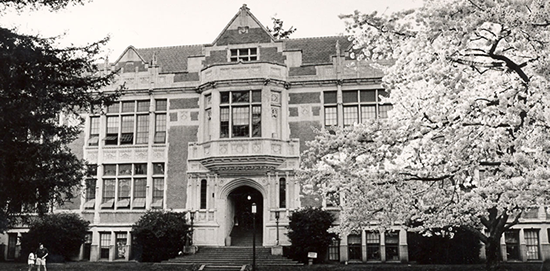Department of Economics Highlights:
- 1875 – First economics course taught at UW
- 1917 – The Department of Economics founded as part of the College of Liberal Arts
- 1933 – Formation of the College of Economics and Business
- 1948 – The Department of Economics is restored to the College of Arts & Sciences
- 1993 – Professor Douglass North awarded the Nobel Prize in Economic Sciences
- 1996 – The Department begins offering the Bachelor of Science (BS) degree
- 2009 – Economics becomes a competitive major
The first economics course offered at the University of Washington was Political Economy, which was taught from 1875 to 1897 by a member of the faculty of Philosophical Sciences. The study and influence of economics at the University were heightened by Dr. J. Allen Smith, who came to the UW in 1897. Dr. Smith expanded the one-quarter Political Economy course into three consecutive one-quarter courses: The Elements of Political Economy, Economic Theory, andDevelopment of Economic Thought. The courses were taught in the Department of Political and Social Sciences.
In 1917, the Department of Economics was founded as part of the College of Liberal Arts, which was also home to the fledgling Political Science and Sociology departments. Also around this time, the College of Commerce (later the College of Business Administration) was formed.
The first Dean of the College of Business Administration was Dr. Carlton Parker, a professor with a keen interest in the liberal arts and an affinity for economics. His successors, however, were increasingly interested in the areas of administration and profit, leading to a strong academic emphasis on business. In the 1930’s, the College came under considerable public criticism regarding its educational function. In 1931, the College was reduced to a two-year program and made into a department within the College of Liberal Arts. Then in 1933, Business Administration was appropriated to form the College of Economics and Business. Interestingly, the Economics Department continued to be listed under liberal arts while the courses, faculty, and budget were moved to this newly-created college.
There existed between some economists and some business faculty fundamental and irreconcilable differences in disciplinary approach. The economics faculty was outnumbered by the business faculty and many economists felt they had no control over academic policy, appointments, promotions, dismissals, and course offerings. Faculty from both disciplines petitioned University administration to reorganize the College of business Administration by separating the two, arguing, among other things, that the applied nature of business education and the theoretical nature of economics education did not mesh. Outside the College, business leaders were petitioning for a better business school that included a closer association between local business and the College, while at the same time graduate students of economics were calling for more academic emphasis at the advanced level in economic study.
In 1948, amid intense controversy, the College of Economics and Business was dissolved. The School of Business Administration was created and the Economics department was restored to the College of Arts & Sciences. Graduates from academic year 1948-1949 were granted a degree from the College of Economics and Business; graduates from 1949-1950 could choose whether their degree was granted by the College of Economics and Business, the College of Arts & Sciences, or the School of Business Administration; thereafter, Economics graduates received their degrees from the College of Arts & Sciences.
In 1996, the Department began offering the Bachelor of Science in Economics. The content of the course material for the degree is more quantitative and theoretical than that of the BA, and the math requirements more stringent. The BS offering has been popular, growing to approximately 20% of the total number of degrees offered.
Nobel prize in Economics laureate Douglass North joined the faculty in 1952 as an assistant professor, and was Professor of Economics from 1960 – 1983. He was awarded the Nobel prize with co-recipient Robert W. Fogel in 1993 for “for having renewed research in economic history by applying economic theory and quantitative methods in order to explain economic and institutional change.”
The economics major has long been popular among undergraduates at UW. Students are attracted to the idea of acquiring “an economic way of thinking” which enhances their ability to understand and solve problems in their careers and in their lives as private citizens. Economics majors, in general, learn how to reason effectively, and in particular, how to work with theoretical models of individual and institutional behavior. Indeed, the popularity of the major required that, in Autumn 2009, the degree became a competitive major.
In addition to Douglass North’s Nobel prize, Department of Economics faculty honors include one or more Fellows in the following: Econometric Society; Association of Environmental and Resource Economists; Ford Foundation; Society of Labor Economists; and the Rockefeller Foundation. Additionally, our faculty possess three honorary doctorates and serve in various leadership positions in economic societies and for industry journals and reviews.
